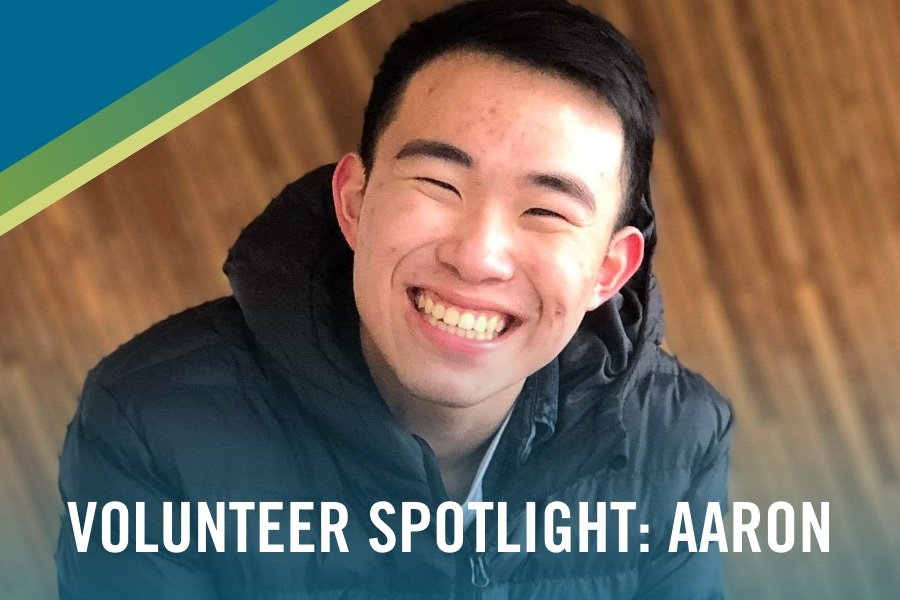Volunteer Spotlight: Aaron
Aaron has always been the supportive and empathetic ear that his friends and family turn to during difficult times. It’s part of the reason why he decided to pursue education and a career in counselling. Wanting to receive front-line experience in talking to and helping others, he signed up to become a Distress Centre crisis line volunteer.
Aaron was part of the March 2020 training group at Distress Centre. Unfortunately, the training was put on pause and then cancelled as the COVID-19 pandemic unfolded. Until this point, Distress Centre had always trained volunteers on-site and had volunteers complete their shifts on-site. A new way of working was required. In June 2020, we hosted our first virtual training cohort, which Aaron joined. He began responding to crisis chats remotely in August 2020. It wasn’t until January 2021 that he began to take crisis calls, nearly a year after he had initially set out to do just that.
We appreciate Aaron for sticking it out through the ups and downs of the unprecedented first year of COVID-response. Being in both the cancelled March training group and the inaugural virtual training cohort makes him a part of Distress Centre history!
Leader and mentor
In January 2022, Aaron transitioned into a leadership volunteer role at Distress Centre. Leadership volunteers help train new volunteers through mentorship and coaching shifts – the leadership volunteer listens in and provides feedback while the volunteer-in-training takes calls. Aaron has found it very motivating to support volunteers in their training and to see their growth. His leadership role allows him to pass on what he has learned and “pay it forward” so that new volunteers can feel confident when taking calls.
“I know that I can’t solve all their problems or prepare them for every single call, but seeing a volunteer start, when they have those nervous jitters, and then seeing how they’ve grown as a crisis line volunteer, in their comfortability, their mindset and their skill sets – to have played a role in making them feel more confident – that’s what makes me feel fulfilled as a leadership volunteer.”
Volunteering
Aaron finds the experience he gets volunteering with Distress Centre, both in taking calls and supporting new volunteers, to be very valuable. As he continues to study to become a counsellor, Aaron appreciates how volunteering provides him with the practical experience and skills that he might not gain in a classroom setting. While his studies at university give him the academic training he needs to succeed, volunteering challenges him with real-life situations and motivates him with a sense of accomplishment.
Aaron once received a call from someone who was considering a controversial medical procedure. Aaron described this call as a ‘eureka moment’ for him. Partway into the call, he realized he needed to change how he was responding to the caller. At first, he had been looking for solutions and resources for this person, but he quickly realized that what he actually needed to do was simply listen and be curious.
Aaron explained that while there are many qualities necessary for success as a crisis line volunteer, like empathy and perspective-taking, an overarching theme for him is curiosity and desire to learn. In a role like this, Aaron believes that being curious about the world around you and the human condition will go a long way.
Aaron said that call had taught him that “even though this call doesn’t change the grand scheme of things in the caller’s life, it gave them a space to talk about something that other people might not be as willing to hear. That was valuable for me to know that the work that I’m doing as a crisis line volunteer was making an impact.”
Self-care
For Aaron, self-care is reading books, listening to podcasts, and using his train commute after a shift to decompress and simply be present. Aaron finds it particularly important to stay mindful of what his role as a volunteer is, and what it isn’t, especially after a challenging shift. He explained that it is unrealistic to think you can save everyone.
It’s understanding that “you are here as a crisis line volunteer, not a counsellor” and understanding the scope of that role – to listen, provide emotional support, and empower the caller to address their life problems.
Volunteer at Distress Centre!
Aaron finds great fulfillment in his helping role as a leadership volunteer. For those interested in learning and contributing to their community, Aaron believes volunteering can be a great way to gain experience and give back. It also provides an opportunity to meet new people, learn important life skills, and understand different perspectives.
For anyone still nervous or hesitant about volunteering, Aaron wanted to remind them that, at the end of the day, each call is “a conversation between human beings.”
Thank you for volunteering Aaron! Want to join him? Apply to volunteer today!

